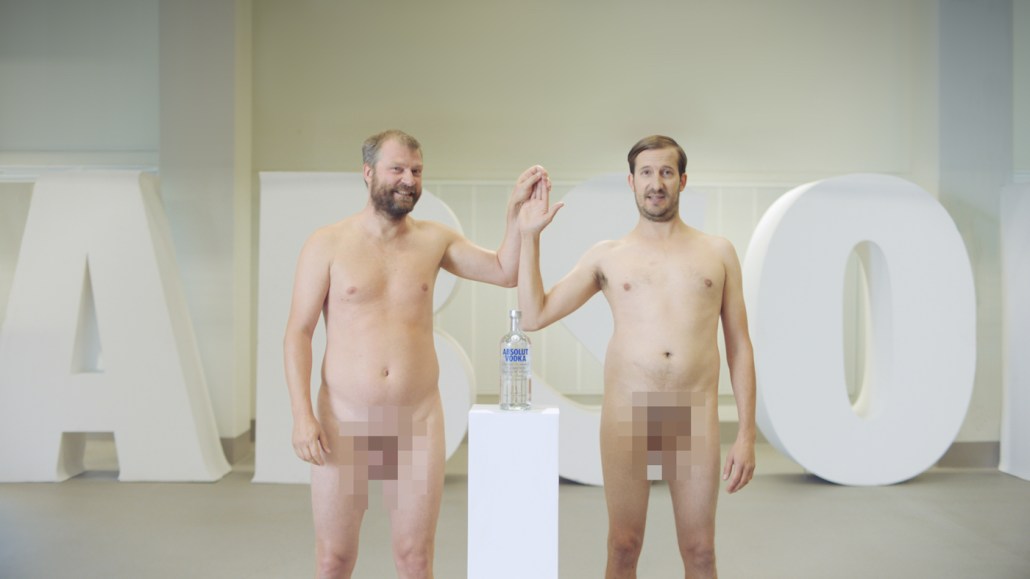Secure your place at the Digiday Publishing Summit in Vail, March 23-25

Provenance and transparency aren’t just things Absolut talks about in an ad campaign. Both are becoming key to the brand’s shift from approaching media as a commodity it buys at the lowest cost to operating as a lever for growth.
The advertiser’s latest global ads feature its employees in the nude to show it is the “vodka with nothing to hide.” It’s an apt statement, with Absolut and owner Pernod Ricard trying to get clarity on what happens to their budgets on the likes of Facebook and YouTube. Despite a lack of transparency in advertising measurement and the spread of fake news, the duopoly’s audience is just too attractive for brands, said Craig Johnson, Absolut’s chief marketing officer.
Johnson outlined for Digiday a more measured approach to working with the platforms that is closer to the lower-key approach of Unilever marketing boss Keith Weed than the more combative stance of their Procter & Gamble counterpart, Marc Pritchard. Below are excerpts, lightly edited and condensed.
How have you exerted more control of the media strategy with the latest campaign?
When we launched “The Vodka with Nothing to Hide” campaign, we did all the global media [planning] in-house. We wanted to make sure we had the right collaborators, so we were having one-on-one conversations with suppliers that we know shared our values and beliefs. It wasn’t a scattered approach and meant that we were directly talking to certain partners like BuzzFeed and Facebook. We wanted to make sure that we worked with a limited number of partners. We don’t do everything this way, but we feel that those partnerships are the best way sometimes to get the best value for what we want to do. Yes, we do programmatic because we need to be where our consumers are. But the programmatic buys we’re making now prioritize quality [inventory].
Can Absolut increase reach by reducing waste?
We have been able to increase our reach by reducing waste by focusing on higher-quality ads. But that higher quality generally comes with a cost. We’re prepared to pay more as long as we know that we have good reach. We’ve seen that in the latest campaign, where we’re working with partners on a cost-per-view basis, that cost has been the least costly for us. It’s very efficient this time around because we have good suppliers and partnerships.
How much responsibility lies with marketers?
It’s down to us to use due diligence to drive as much efficiency through everything that we do. I think the digital space, to some degree, is no different to out of home or TV when it comes to how we try and get reach. All those mediums are a bit of an inexact science, but the idea is try and use our scale, our [buying] power and our collaborations to get the best value for our dollars.
With the duopoly’s transparency issues, why are you confident in the media you’re spending on those platforms?
It comes down to working closely with our partners. Clearly, some [platforms] have been more open than others when it comes to measurement. However, the best way for us to truly get a read on how content is working is the feedback that we get directly from the consumer, whether it’s comments, shares or through the ad hoc research that we’re doing. A/B testing and measuring trends give you great insights, but truly what we want to understand is how our content is affecting the behavior of consumers and whether what we do strikes a chord with consumers. And the only way for us to do that now is through direct conversations with people on whatever channel.
Is it a concern that you may have to pay more for ads in Facebook’s walled garden following its algorithm change?
We’re trying to make sure we get value for our dollar to reach our consumers, so of course it [price hikes after the news-feed change] is a concern for us. We know that Facebook is a great platform to reach consumers, so we’re not worried about the algorithm change. If they weren’t good partners with us when we launch campaigns, then it might be more of a concern. If we see any [change], then of course we’ll respond, but at the end of the day, it’s about being where our consumers are. When it comes to them [Facebook] being a better citizen and creating an environment that’s safe, then that’s something we support.
Diageo paused spend on Snapchat earlier this year over age-verification concerns. Does Absolut run ads on Snapchat?
We’re not doing anything with Snapchat currently. We’re trying to be responsible and make sure that it [Snapchat] follows our code. We’re in a watch-and-study mode with it.
More in Media

How creator talent agencies are evolving into multi-platform operators
The legacy agency model is being re-built from the ground up to better serve the maturing creator economy – here’s what that looks like.

Why more brands are rethinking influencer marketing with gamified micro-creator programs
Brands like Urban Outfitters and American Eagle are embracing a new, micro-creator-focused approach to influencer marketing. Why now?

WTF is pay per ‘demonstrated’ value in AI content licensing?
Publishers and tech companies are developing a “pay by demonstrated value” model in AI content licensing that ties compensation to usage.





